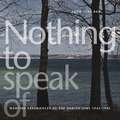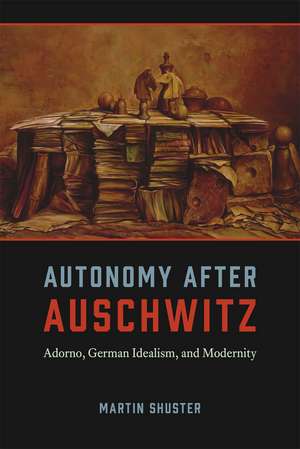Autonomy After Auschwitz: Adorno, German Idealism, and Modernity: Emersion: Emergent Village resources for communities of faith
Autor Martin Shusteren Limba Engleză Hardback – 12 sep 2014
Ever since Kant and Hegel, the notion of autonomy—the idea that we are beholden to no law except one we impose upon ourselves—has been considered the truest philosophical expression of human freedom. But could our commitment to autonomy, as Theodor Adorno asked, be related to the extreme evils that we have witnessed in modernity? In Autonomy after Auschwitz, Martin Shuster explores this difficult question with astonishing theoretical acumen, examining the precise ways autonomy can lead us down a path of evil and how it might be prevented from doing so.
Shuster uncovers dangers in the notion of autonomy as it was originally conceived by Kant. Putting Adorno into dialogue with a range of European philosophers, notably Kant, Hegel, Horkheimer, and Habermas—as well as with a variety of contemporary Anglo-American thinkers such as Richard Rorty, Stanley Cavell, John McDowell, and Robert Pippin—he illuminates Adorno’s important revisions to this fraught concept and how his different understanding of autonomous agency, fully articulated, might open up new and positive social and political possibilities. Altogether, Autonomy after Auschwitz is a meditation on modern evil and human agency, one that demonstrates the tremendous ethical stakes at the heart of philosophy.
Shuster uncovers dangers in the notion of autonomy as it was originally conceived by Kant. Putting Adorno into dialogue with a range of European philosophers, notably Kant, Hegel, Horkheimer, and Habermas—as well as with a variety of contemporary Anglo-American thinkers such as Richard Rorty, Stanley Cavell, John McDowell, and Robert Pippin—he illuminates Adorno’s important revisions to this fraught concept and how his different understanding of autonomous agency, fully articulated, might open up new and positive social and political possibilities. Altogether, Autonomy after Auschwitz is a meditation on modern evil and human agency, one that demonstrates the tremendous ethical stakes at the heart of philosophy.
Din seria Emersion: Emergent Village resources for communities of faith
-
 Preț: 144.99 lei
Preț: 144.99 lei - 9%
 Preț: 352.50 lei
Preț: 352.50 lei -
 Preț: 307.55 lei
Preț: 307.55 lei -
 Preț: 146.50 lei
Preț: 146.50 lei - 8%
 Preț: 360.28 lei
Preț: 360.28 lei -
 Preț: 185.37 lei
Preț: 185.37 lei -
 Preț: 183.89 lei
Preț: 183.89 lei -
 Preț: 115.53 lei
Preț: 115.53 lei - 6%
 Preț: 324.95 lei
Preț: 324.95 lei - 8%
 Preț: 346.31 lei
Preț: 346.31 lei -
 Preț: 67.35 lei
Preț: 67.35 lei -
 Preț: 101.43 lei
Preț: 101.43 lei -
 Preț: 216.90 lei
Preț: 216.90 lei - 18%
 Preț: 2261.34 lei
Preț: 2261.34 lei -
 Preț: 215.52 lei
Preț: 215.52 lei -
 Preț: 167.85 lei
Preț: 167.85 lei -
 Preț: 179.04 lei
Preț: 179.04 lei - 12%
 Preț: 290.56 lei
Preț: 290.56 lei -
 Preț: 156.84 lei
Preț: 156.84 lei - 9%
 Preț: 353.24 lei
Preț: 353.24 lei -
 Preț: 186.09 lei
Preț: 186.09 lei -
 Preț: 176.49 lei
Preț: 176.49 lei -
 Preț: 133.99 lei
Preț: 133.99 lei -
 Preț: 144.80 lei
Preț: 144.80 lei - 18%
 Preț: 348.59 lei
Preț: 348.59 lei -
 Preț: 138.26 lei
Preț: 138.26 lei -
 Preț: 163.52 lei
Preț: 163.52 lei - 18%
 Preț: 502.35 lei
Preț: 502.35 lei -
 Preț: 182.98 lei
Preț: 182.98 lei -
 Preț: 208.55 lei
Preț: 208.55 lei -
 Preț: 279.55 lei
Preț: 279.55 lei - 8%
 Preț: 563.24 lei
Preț: 563.24 lei -
 Preț: 116.07 lei
Preț: 116.07 lei -
 Preț: 120.81 lei
Preț: 120.81 lei -
 Preț: 160.63 lei
Preț: 160.63 lei - 9%
 Preț: 352.77 lei
Preț: 352.77 lei -
 Preț: 106.35 lei
Preț: 106.35 lei -
 Preț: 273.93 lei
Preț: 273.93 lei -
 Preț: 316.40 lei
Preț: 316.40 lei -
 Preț: 548.71 lei
Preț: 548.71 lei -
 Preț: 138.81 lei
Preț: 138.81 lei -
 Preț: 152.25 lei
Preț: 152.25 lei -
 Preț: 229.92 lei
Preț: 229.92 lei -
 Preț: 94.22 lei
Preț: 94.22 lei -
 Preț: 203.53 lei
Preț: 203.53 lei -
 Preț: 145.41 lei
Preț: 145.41 lei - 8%
 Preț: 311.68 lei
Preț: 311.68 lei -
 Preț: 208.32 lei
Preț: 208.32 lei -
 Preț: 302.76 lei
Preț: 302.76 lei - 8%
 Preț: 565.01 lei
Preț: 565.01 lei
Preț: 254.36 lei
Preț vechi: 303.67 lei
-16% Nou
Puncte Express: 382
Preț estimativ în valută:
48.68€ • 52.86$ • 40.89£
48.68€ • 52.86$ • 40.89£
Carte indisponibilă temporar
Doresc să fiu notificat când acest titlu va fi disponibil:
Se trimite...
Preluare comenzi: 021 569.72.76
Specificații
ISBN-13: 9780226155487
ISBN-10: 022615548X
Pagini: 216
Dimensiuni: 152 x 229 x 18 mm
Greutate: 0.43 kg
Ediția:New.
Editura: University of Chicago Press
Colecția University of Chicago Press
Seria Emersion: Emergent Village resources for communities of faith
ISBN-10: 022615548X
Pagini: 216
Dimensiuni: 152 x 229 x 18 mm
Greutate: 0.43 kg
Ediția:New.
Editura: University of Chicago Press
Colecția University of Chicago Press
Seria Emersion: Emergent Village resources for communities of faith
Notă biografică
Martin Shuster is chair of the Department of Philosophy and Religious Studies at Avila University in Kansas City, MO and is cofounder of the Association for Adorno Studies.
Cuprins
Acknowledgments
Abbreviations
Introduction
1. I Against I: Stressing the Dialectic in the Dialectic of Enlightenment
1. Introduction
2. The Text of the Dialectic of Enlightenment
3. Enlightenment as a Historical Category?
4. The Concept of Enlightenment, and Enlightenment and Myth
5. Images and Signs
6. The Dissolution of Subjectivity
7. The Dialectic of Enlightenment and Kant’s Dialectic of Reason
8. Adorno on Kant’s Dialectic
9. The Necessity of the Dialectic of Enlightenment
10. The Dialectic of Enlightenment and Practical Reason
11. Conclusion
2. Beyond the Bounds of Sense: Kant and the Highest Good
1. Introduction
2. Morality and the Highest Good
3. The Highest Good in the Critique of Pure Reason
4. The Garve Review
5. The Highest Good in the Critique of Practical Reason
6. The Highest Good in the Critique of Judgment
7. Conclusion
3. Adorno’s Negative Dialectic as a Form of Life: Expression, Suffering, and Freedom
1. Introduction
2. Toward an Understanding of the Moral Addendum
3. Natural and Normative: Some Variations
4. The Addendum
5. The Background to Adorno’s Moral Thought
6. Speculative Surplus and Depth as Freedom
7. Freedom and Expression, Happiness and Suffering
8. Expressivity, Language, and Truth
9. Morality and the Nonidentical
10. Conclusion: Kant and Freedom
4. Reflections on Universal Reason: Adorno, Hegel, and the Wounds of Spirit
1. Introduction
2. The Methodology of the Phenomenology of Spirit
3. From the Science of the Experience of Consciousness to the Phenomenology of Spirit
4. Spirit
5. Universal Reason and Forgiveness
6. Conclusion
Model: Conclusion
Works Cited
Index
Abbreviations
Introduction
1. I Against I: Stressing the Dialectic in the Dialectic of Enlightenment
1. Introduction
2. The Text of the Dialectic of Enlightenment
3. Enlightenment as a Historical Category?
4. The Concept of Enlightenment, and Enlightenment and Myth
5. Images and Signs
6. The Dissolution of Subjectivity
7. The Dialectic of Enlightenment and Kant’s Dialectic of Reason
8. Adorno on Kant’s Dialectic
9. The Necessity of the Dialectic of Enlightenment
10. The Dialectic of Enlightenment and Practical Reason
11. Conclusion
2. Beyond the Bounds of Sense: Kant and the Highest Good
1. Introduction
2. Morality and the Highest Good
3. The Highest Good in the Critique of Pure Reason
4. The Garve Review
5. The Highest Good in the Critique of Practical Reason
6. The Highest Good in the Critique of Judgment
7. Conclusion
3. Adorno’s Negative Dialectic as a Form of Life: Expression, Suffering, and Freedom
1. Introduction
2. Toward an Understanding of the Moral Addendum
3. Natural and Normative: Some Variations
4. The Addendum
5. The Background to Adorno’s Moral Thought
6. Speculative Surplus and Depth as Freedom
7. Freedom and Expression, Happiness and Suffering
8. Expressivity, Language, and Truth
9. Morality and the Nonidentical
10. Conclusion: Kant and Freedom
4. Reflections on Universal Reason: Adorno, Hegel, and the Wounds of Spirit
1. Introduction
2. The Methodology of the Phenomenology of Spirit
3. From the Science of the Experience of Consciousness to the Phenomenology of Spirit
4. Spirit
5. Universal Reason and Forgiveness
6. Conclusion
Model: Conclusion
Works Cited
Index
Recenzii
“Shuster claims to have ‘reconstructed a formal model for understanding ourselves as agents.’ This reconstructed model replaces the traditional model of ethical action—in which intention and choice are paramount—with a jointly Adornian and Cavellian one, in which moral action is solicited from within interpersonally situated forms of life and experience. Shuster has developed this model with care and makes careful interventions into the reading of some major figures in developing it. Throughout, the claims advanced are convincingly and helpfully situated in relation to recent scholarship within both Anglophone philosophy and the European post-Kantian tradition. As the author himself notes, this reconstructed position stands in need of further elaboration. But Shuster does more than enough to suggest that this would be a task worth undertaking.”
“A series of intricate investigations of autonomy in modern and contemporary philosophy. The chapter on ‘negative dialectics,’ which forms the core of the book, is outstanding. . . . Shuster does excellent work in bringing Adorno into contemporary philosophical discussion.”
